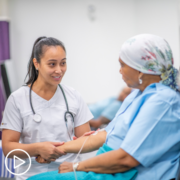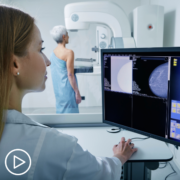Innovative Approaches to Endometrial Cancer Care in Underrepresented Communities
Innovative Approaches to Endometrial Cancer Care in Underrepresented Communities from Patient Empowerment Network on Vimeo.
How can endometrial cancer care use innovative approaches in underrepresented communities? Expert Dr. Emily Hinchcliff from Northwestern Medicine discusses diagnostic testing tools and support in navigating clinical trials.
[ACT]IVATION TIP
“… doing your own research and your own reading is really important, being your own advocate. But I think that your physician can serve as an excellent, almost medical translator to understand what is right for you and which of the many, many novel things that we are discovering every day is applicable to you and which might be good for you and which don’t actually apply or which are not potentially your best option in that side.”
Download Guide | Descargar Guía en Español
See More from [ACT]IVATED Endometrial Cancer
Related Resources:

|

Overcoming Barriers: Empowering Underrepresented Groups With Endometrial Cancer |

Endometrial Cancer Care Disparities: The Impact of Rural Residence |
Transcript:
Lisa:
Dr. Hinchcliff, are there any innovative approaches or technologies that you and your team are exploring to improve endometrial detection, treatment, or support services, especially for your underrepresented communities with limited access to healthcare resources?
Dr. Emily Hinchcliff:
Yeah, so there are many, many different things that we’re doing here that we’re very excited about. I think I’ll probably highlight two. So one of the ones that I have been working on closely is there is an ever-increasing number of diagnostic testing tools that we have within our kind of armamentarium. And so one particular test that patients may have read about or heard about is something called circulating tumor DNA. And this is a pretty novel test that I will be completely open and honest that we don’t totally know how to use or how to incorporate in our cancer surveillance, meaning so once someone is diagnosed, is this a test that can help us to watch to see if treatments are working or watch to see if a cancer may have come back? Similarly, can it be used as a screening tool? We just don’t know that, and so that’s an area that I am actively working in.
The other thing that one of my colleagues here is working on is trying to really create access for women who have limited access to healthcare. So we have developed a clinical trial platform to allow the women, specifically of Chicago, to better understand their options for clinical trials across the institutions in Chicago. So we have at Northwestern multiple cutting-edge endometrial cancer trials trying to bring these novel therapeutics to the forefront and to patients and also to thoughtfully triage patients to kind of treatments that we think are going to maximize their effectiveness and minimize toxicity.
But similar to us, the other institutions around Chicago have a different panel of clinical trials. And so for patients, it can be really overwhelming to know which trial, which institution, how do I know, how do I access all of that? And so we’re working to create a platform for patients and to have clinical navigators associated to help them to understand their options.
Lisa:
And do you have an activation tip?
Dr. Emily Hinchcliff:
So I think that when patients are thinking about innovation and how can they make sure that they are at the cutting edge, I think that your physician is really your access point. So obviously, doing your own research and your own reading is really important, being your own advocate. But I think that your physician can serve as an excellent, almost medical translator to understand what is right for you and which of the many, many novel things that we are discovering every day is applicable to you and which might be good for you and which don’t actually apply or which are not potentially your best option in that side.










